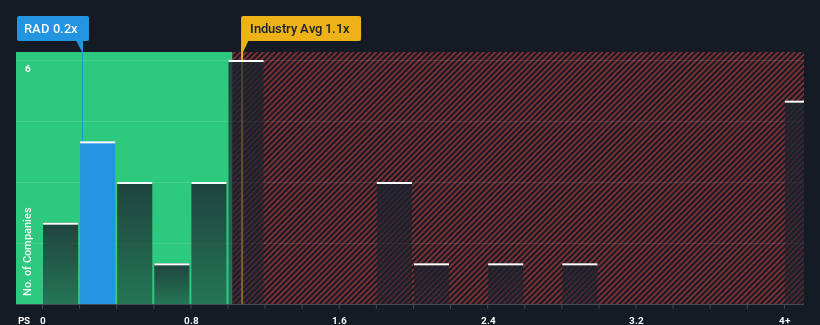- New Zealand
- /
- Healthcare Services
- /
- NZSE:RAD
Radius Residential Care Limited (NZSE:RAD) Might Not Be As Mispriced As It Looks After Plunging 27%

To the annoyance of some shareholders, Radius Residential Care Limited (NZSE:RAD) shares are down a considerable 27% in the last month, which continues a horrid run for the company. For any long-term shareholders, the last month ends a year to forget by locking in a 60% share price decline.
Following the heavy fall in price, given about half the companies operating in New Zealand's Healthcare industry have price-to-sales ratios (or "P/S") above 1.1x, you may consider Radius Residential Care as an attractive investment with its 0.2x P/S ratio. Although, it's not wise to just take the P/S at face value as there may be an explanation why it's limited.
View our latest analysis for Radius Residential Care

What Does Radius Residential Care's Recent Performance Look Like?
Revenue has risen firmly for Radius Residential Care recently, which is pleasing to see. It might be that many expect the respectable revenue performance to degrade substantially, which has repressed the P/S. If you like the company, you'd be hoping this isn't the case so that you could potentially pick up some stock while it's out of favour.
We don't have analyst forecasts, but you can see how recent trends are setting up the company for the future by checking out our free report on Radius Residential Care's earnings, revenue and cash flow.How Is Radius Residential Care's Revenue Growth Trending?
The only time you'd be truly comfortable seeing a P/S as low as Radius Residential Care's is when the company's growth is on track to lag the industry.
Retrospectively, the last year delivered an exceptional 16% gain to the company's top line. Pleasingly, revenue has also lifted 37% in aggregate from three years ago, thanks to the last 12 months of growth. Therefore, it's fair to say the revenue growth recently has been superb for the company.
Weighing that recent medium-term revenue trajectory against the broader industry's one-year forecast for expansion of 9.1% shows it's about the same on an annualised basis.
With this in consideration, we find it intriguing that Radius Residential Care's P/S falls short of its industry peers. Apparently some shareholders are more bearish than recent times would indicate and have been accepting lower selling prices.
The Final Word
The southerly movements of Radius Residential Care's shares means its P/S is now sitting at a pretty low level. While the price-to-sales ratio shouldn't be the defining factor in whether you buy a stock or not, it's quite a capable barometer of revenue expectations.
Our examination of Radius Residential Care revealed its three-year revenue trends looking similar to current industry expectations hasn't given the P/S the boost we expected, given that it's lower than the wider industry P/S, There could be some unobserved threats to revenue preventing the P/S ratio from matching the company's performance. revenue trends suggest that the risk of a price decline is low, investors appear to perceive a possibility of revenue volatility in the future.
Don't forget that there may be other risks. For instance, we've identified 4 warning signs for Radius Residential Care (2 shouldn't be ignored) you should be aware of.
If companies with solid past earnings growth is up your alley, you may wish to see this free collection of other companies with strong earnings growth and low P/E ratios.
If you're looking to trade Radius Residential Care, open an account with the lowest-cost platform trusted by professionals, Interactive Brokers.
With clients in over 200 countries and territories, and access to 160 markets, IBKR lets you trade stocks, options, futures, forex, bonds and funds from a single integrated account.
Enjoy no hidden fees, no account minimums, and FX conversion rates as low as 0.03%, far better than what most brokers offer.
Sponsored ContentNew: AI Stock Screener & Alerts
Our new AI Stock Screener scans the market every day to uncover opportunities.
• Dividend Powerhouses (3%+ Yield)
• Undervalued Small Caps with Insider Buying
• High growth Tech and AI Companies
Or build your own from over 50 metrics.
Have feedback on this article? Concerned about the content? Get in touch with us directly. Alternatively, email editorial-team (at) simplywallst.com.
This article by Simply Wall St is general in nature. We provide commentary based on historical data and analyst forecasts only using an unbiased methodology and our articles are not intended to be financial advice. It does not constitute a recommendation to buy or sell any stock, and does not take account of your objectives, or your financial situation. We aim to bring you long-term focused analysis driven by fundamental data. Note that our analysis may not factor in the latest price-sensitive company announcements or qualitative material. Simply Wall St has no position in any stocks mentioned.
About NZSE:RAD
Radius Residential Care
Provides health and aged care services for elderly and disabled people in New Zealand.
Fair value with moderate growth potential.
Market Insights
Community Narratives



